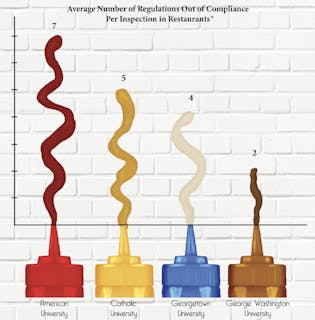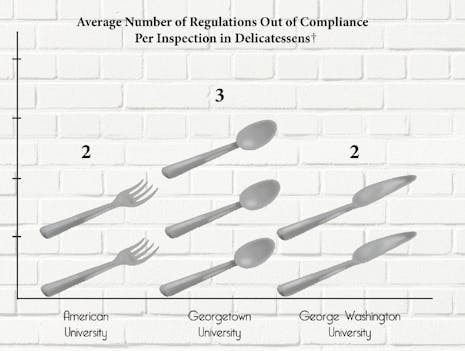From the Newsstands: This story appeared in The Eagle's November 2022 print edition. You can find the digital version here.
One meal swipe at American University is equivalent to about $12.50, but despite the price, health code violations found in recent food safety inspections and inconsistent food quality have left some students worried about what is on their plates.
DC Health conducted three inspections in 2022 of the Mary Graydon Center at AU, all of which showed multiple violations of food safety regulations. MGC currently houses most of the University’s main dining locations, such as Paper Lantern, True Burger, Einstein Bros. Bagel, District Pickle and Terrace Dining Room — the only dining hall on campus.
“For all the money we're paying intuition, it's really disappointing to hear and see all these people who refuse to eat there,” said Julianna Greenberg, a freshman in the School of Public Affairs. “We get sick from eating there.”
The inspections of MGC took place on March 24, Sept. 21 and Sept. 28. Some of the observations made by the inspector in the reports include but are not limited to workers not wearing hair restraints, unlabeled plastic squeeze bottles filled with unknown liquids and containers of prepared food not being properly labeled with dates and contents.
According to University spokesperson Jasmine Pelaez, all violations found in the March 24 and Sept 21. reports were fixed by the Sept. 28 inspection. However, new violations were found on Sept. 28, such as workers not having properly washed hands, no accurate thermometers provided and improper disposal of garbage and facility maintenance.
Inside the inspection reports
The Eagle obtained the three health inspection reports of MGC from 2022 as well as other 2022 inspection reports of the campus’ Subway and Starbucks locations from the DC Health’s food inspection report online database, which houses all safety reports conducted by the DC Health Food Safety and Hygiene Inspection Services Division. An inspection report includes the establishment name, address, phone number, Basic Business License number and license period, establishment type, type of inspection, email address and risk category.
Some violations, referred to as Core Violations, must be corrected within 14 days of the inspection. Priority Violations must be corrected within five days. Violations that need to be corrected include out of compliances. When a violation is marked as Corrected On Site, it means that it was fixed during the inspection, eliminating the need for a future inspection into the matter.
The inspections of MGC, Subway and Starbucks included routine, follow-up and complaint, as noted on each individual report. A routine inspection is an unannounced periodic inspection part of a regulatory regime. A follow-up inspection is the purpose of re-inspecting items that were out of compliance. Complaint inspections are carried out in response to complaints that the health department receives.
All three of the inspection reports for MGC were listed as “complaint,” meaning that a complaint was submitted about the facility to DC Health via their online facility complaint form or by email. A complaint against a facility will automatically initiate an inspection.
Pelaez wrote that, contrary to what was stated on the inspection report, the Sept. 28 inspection was a “reinspection,” not a complaint. Pelaez did not say whether or not the University thought the classification of “complaint” on the Sept. 28 report was a mistake on DC Health’s part.
“The University stated that the 9/28 inspection of the Mary Graydon Center (MGC) was a reinspection, not a follow up,” Pelaez wrote in an email to The Eagle. “This was based on the University’s understanding from the health inspector that the 9/28 inspection was a reinspection based on the 9/21 complaint inspection. The health inspector and the D.C. Department of Health are responsible for the report categorization and content.”
There is no inspection type listed on DC Health’s website called a “reinspection.”
The Eagle requested to interview University officials, but the AU Office of Communications and Marketing would only provide written responses to questions over email. The Eagle also reached out individually over email to multiple AU Dining officials for interviews, but they did not respond.
Risk categories vary, with “one” representing the lowest risk level and “five” representing the highest. The purpose and range of any specific food establishment determine the risk category. The more hazardous ingredients and specialized processes being used in the facility, the higher the risk level will be. Higher risk facilities get routine inspections without prior notice more frequently than lower risk ones. Regardless of the given risk category, a complaint will result in an inspection. The University was categorized as a moderate risk of “three” from all three inspections in 2022.
The Eagle reached out to DC Health to speak with Ross J. Gateretse, who inspected AU’s dining facilities, but was told by DC Health Spokesperson Robert Mayfield over email that the “reports speak for themselves.” DC Health did not respond to follow-up questions after multiple attempts to reach out via email and phone call.
What students say
After hearing about the Sept. 21 inspection report of MGC through social media, some students expressed frustration over the violations and how they were handled by the University. “I'm surprised that they were allowed to keep serving food and not face any repercussions because of the violations they faced,” Greenberg said. “I know that they had five days, I believe, to fix the food, but I've still noticed problems since I've been there.”
Despite the wide circulation of the report on social media, some students were still unaware of the violations found Sept. 21.
“I think an email would have been good,” said Sarah Mangham, a sophomore in SPA who had not heard of the inspection or the violations that were found until an interview with The Eagle. “I mean, I haven't been on social media in the past few days. They probably posted about it. Or maybe not, actually, though. But if they did, cool, if they didn't, they should post about it.”
The University did not post about the inspection results on social media nor send an email to students, though the inspection reports were posted in TDR, as DC Health code requires that the University post all timely inspection reports, according to Pelaez.
“We are working to improve the visibility of these postings,” Pelaez wrote. “Starting in January 2023, we will transition to a more visible and easily understandable health inspection posting system. As part of this system, we will make our D.C. Department of Health inspection reports and other routine independent inspection reports available electronically to our community members.”
Even before news of the inspection was spread by students and parents, some had already noticed irregular quality in the food they were being served and the conditions of the dining facilities.
“I've been [to TDR], and the plates have been dirty or the utensils will be dirty,” Greenberg said. “I've noticed undercooked meat, like nine out of 10 times that I've eaten meat there. I know people who've gotten food poisoning, who've had stomach pains or nausea. I personally had stomach pain from eating there.”
Greenberg specifically mentioned how she has been served “rotten lettuce” and “tomatoes that are frozen still” at the TDR salad station.
Dan Sirota, a junior in the School of Communication, also noted that the state of the food being served can sometimes be unpredictable.
“You could have something really fantastic one day and then go back the next day and order the exact same thing and it’ll be completely different,” Sirota said. “It’s surprising. There are a lot of really strange inconsistencies that you don't expect to have in the food service industry.”
Cat Goff, a sophomore in the College of Arts and Sciences, said she once had a “fruit sticker still on the tomato in [her] pizza.”
Impacts on safety
Many of the regulations AU was found to be out of compliance with during the inspections of the University’s dining facilities in 2022 have strong implications on potential hazards in the food being served.
“The issues identified by DC Health related mostly to lack of documentation or records to demonstrate consistent adherence to the identified health code provisions,” Pelaez wrote. “Had the inspection identified any unacceptable risks, DC Health would have ordered additional actions. The University promptly corrected the findings, which included immediate cleaning, and disposal of food items in the vicinity.”
However, Bart Dobek, a food safety consultant based in Illinois with BD Food Consultants LLC, raised concerns after examining the three 2022 inspection reports of MGC. According to Dobek, even though no food was found to specifically be unsafe at the time of inspection, the findings have broader implications on safety for consumers in general. It was found during the March 24 and Sept. 21 inspections that perishable foods in MGC were not being stored at the proper temperature, which D.C. Health defines as 41 degrees Fahrenheit and below.
On Sept. 21, it was found that raw beef was being kept in the walk-in refrigerator at 46 degrees Fahrenheit, American cheese was being kept in one of the open display refrigerators at 51 degrees Fahrenheit and one of the open display refrigerators as a whole was being kept at 49 degrees Fahrenheit.
“This could lead to growth of microorganisms including pathogens,” Dobek wrote in an email to The Eagle. “Pathogens such as Listeria Monocytogenes or Salmonella can cause illness or in some cases death.”
Listeria monocytogenes, according to the Centers for Disease Control and Prevention, can cause both milder intestinal illness and a more serious invasive illness, especially in newborns, those who are pregnant, over 65 or immunocompromised. Intestinal illness symptoms usually start within 24 hours of exposure and include diarrhea and vomiting. Symptoms of invasive illness start within two weeks of exposure and include fever, flu-like symptoms, headache, confusion, loss of balance, stiff neck and seizures. Dobek also explained that unsanitary conditions in food establishments can increase the risk of foodborne illness.
“Inadequate sanitary conditions at a food establishment may lead to development of environmental pathogens (in this case the most probable would be listeria monocytogenes),” Dobek wrote, referencing a violation from the Sept. 21 inspection of MGC, which included observations of an unclean and rusty can opener, an unclean meat slicer and an unclean prep table. Dobek also examined inspections conducted of the Subway and Starbucks on the University’s campus on Sept. 21, 2022.
“Starbucks had one finding that is concerning about [an] unclean table where food is made and some mold growth in [a] food prep area,” Dobek wrote. “This could lead to food cross contamination and potential illness for consumers.”
This violation was fixed by Sept. 28, according to the follow-up inspection report. He did not find any major concerning violations in the Subway report.
“The D.C. health inspection reports reflect a moderate risk rating and a correction period for the documented items because those items, if uncorrected moving forward, could pose an unacceptable risk to food safety,” Pelaez wrote. “Risk can never be completely eliminated in any food service program. The items documented in the DC Health report indicate the potential for risk if they are not addressed promptly, which they were.”
Although MGC received moderate risk ratings, according to DC Health, risk ratings are not a reflection of a food establishment’s condition upon inspection, but rather if hazardous foods, such as raw ingredients and specialized procedures are being used to prepare food.
Not just AU
AU is not the only university in the district to be flagged as out of compliance with health regulations this year.
An analysis by The Eagle using inspection reports ranging from Jan. 27, 2022 to Oct. 7, 2022 found the average number of health regulations out of compliance per inspection in dining facilities classified by DC Health as “restaurants” at George Washington University was two, four at Georgetown University and five at the Catholic University of America. The average amount of violations found per inspection at AU was seven.

According to DC Health, a restaurant offers food services to customers who order while seated, are served while eating and pay afterward. Restaurants also include providing services such as carryout services. At AU, the only dining facility classified as a restaurant is the entirety of MGC, but all the other universities examined house multiple restaurants.
The analysis also found that from Aug. 4, 2022 to Oct. 7, 2022 the average number of health regulations out of compliance per inspection in dining facilities classified by DC Health as “delicatessens” at Georgetown was three. GWU and AU both had an average of about one per inspection. There was no data on delicatessens available for CUA in 2022.

According to DC Health, a food establishment is classified as a delicatessen where food, drinks or other refreshments are made and sold to be consumed outside of the premises.
Looking to the future
AU says it has taken steps to fix the violations that were found as well as prevent them from occurring again going forward.
“The safety of the food we serve to our students and community members is always a priority for us,” Pelaez wrote. “Over 45,000 meals a week are served in our dining hall and campus retail venues. We follow a continuous improvement model in our dining operations to ensure we meet and exceed health, quality and best practice standards.”
After the March 24 inspection of MGC, Pelaez wrote staff members were retrained in procedures such as how to maintain appropriate documentation and post required notices. They also increased preventative maintenance and routine maintenance work on all equipment and employed a firm that specializes in maintaining the equipment used in campus dining facilities.
AU also provided The Eagle with its DC Health-approved hazard analysis and critical control points plan, which is a strategy that must be approved by DC Health to prevent safety hazards in food, for their sushi rice acidification process. This process was noted as being out of compliance during the March 24 and Sept. 21 inspections.
“The University’s sushi operator had both an approved HACCP plan and variance before service of these items began,” Pelaez wrote. “Unfortunately, our sushi operator did not have these documents available and visibly posted for the Health Inspector to observe. This is a good example of the type of errors found involving documentation. We are addressing this through additional training.”
After the Sept. 21 position, staff were again retrained in maintaining appropriate documentation, posting required notices and adherence to maintenance and replacement schedules for equipment. This was also done after the Sept. 28 inspection, according to Pelaez.
In terms of students paying for meal plans being reimbursed, Pelaez wrote that AU Dining “encourage[s] any community member who has concerns about our dining program to reach out to us at mealplans@american.edu. A dining team member will reach out and set a time for a call or in person meeting to discuss community member concerns.”
The University has also hired a third party health and safety firm to conduct random inspections and a full program audit.
“These inspections are more rigorous and detailed than the DC Department of Health’s inspections,” Pelaez told The Eagle on Oct. 17. “The first additional inspection was last week and resulted in a five out of five-star rating.”
Pelaez later added, "Third party inspections have always been a component of the University’s efforts to maintain the highest health and safety standards. The third-party health and safety inspection firm was hired to conduct additional random inspections and a full program audit to help us identify any procedure, training and equipment issues."
Despite these solutions, some students are still wary, as AU still has not made direct communication with students in regard to the inspections.
“I think that they need to follow more health protocols,” Greenberg said. “They need to cook the meat right so people aren't getting sick. They need to listen to students because I feel like these complaints have been going on for years.”
Although some students must rely on AU Dining facilities this semester, including underclassmen living on campus who are required to pay for meal plans, those who have more discretion in where they eat say they will be avoiding campus food upon hearing about the health code violations.
“I was saying to myself, ‘I don’t really have a need to go to TDR this year,’” Sirota said. “And now it's kind of like ‘yeah, I'm not going to TDR this year.’”
For more information on the methodology behind this database, please click here.





